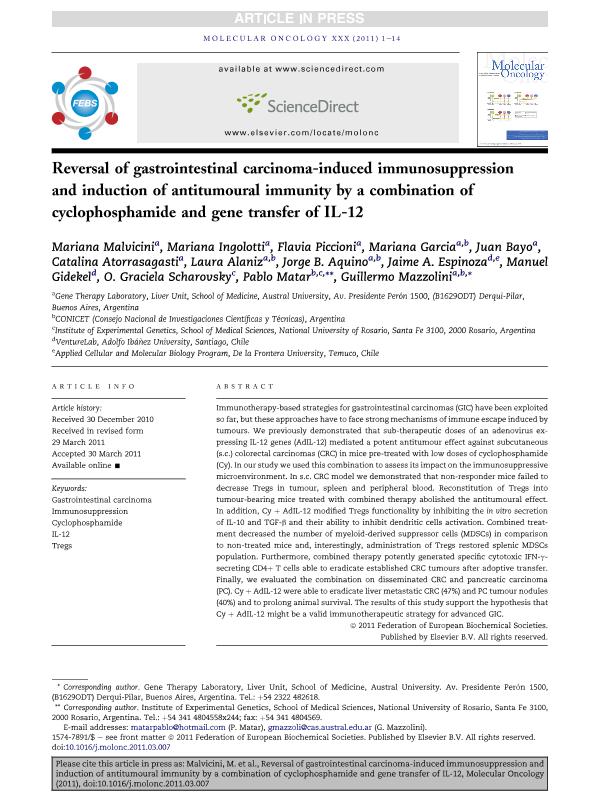Artículo
Reversal of gastrointestinal carcinoma-induced immunosuppression and induction of antitumoural immunity by a combination of cyclophosphamide and gene transfer of IL-12
Malvicini, Mariana ; Ingolotti, Mariana; Piccioni, Flavia Valeria
; Ingolotti, Mariana; Piccioni, Flavia Valeria ; García, Mariana Gabriela
; García, Mariana Gabriela ; Bayo Fina, Juan Miguel
; Bayo Fina, Juan Miguel ; Atorrasagasti, María Catalina
; Atorrasagasti, María Catalina ; Alaniz, Laura Daniela
; Alaniz, Laura Daniela ; Aquino, Jorge Benjamin
; Aquino, Jorge Benjamin ; Espinoza, Jaime A.; Gidekel, Manuel; Scharovsky, Olga Graciela
; Espinoza, Jaime A.; Gidekel, Manuel; Scharovsky, Olga Graciela ; Matar, Pablo
; Matar, Pablo ; Mazzolini Rizzo, Guillermo Daniel
; Mazzolini Rizzo, Guillermo Daniel
 ; Ingolotti, Mariana; Piccioni, Flavia Valeria
; Ingolotti, Mariana; Piccioni, Flavia Valeria ; García, Mariana Gabriela
; García, Mariana Gabriela ; Bayo Fina, Juan Miguel
; Bayo Fina, Juan Miguel ; Atorrasagasti, María Catalina
; Atorrasagasti, María Catalina ; Alaniz, Laura Daniela
; Alaniz, Laura Daniela ; Aquino, Jorge Benjamin
; Aquino, Jorge Benjamin ; Espinoza, Jaime A.; Gidekel, Manuel; Scharovsky, Olga Graciela
; Espinoza, Jaime A.; Gidekel, Manuel; Scharovsky, Olga Graciela ; Matar, Pablo
; Matar, Pablo ; Mazzolini Rizzo, Guillermo Daniel
; Mazzolini Rizzo, Guillermo Daniel
Fecha de publicación:
06/2011
Editorial:
Elsevier
Revista:
Molecular Oncology
ISSN:
1574-7891
Idioma:
Inglés
Tipo de recurso:
Artículo publicado
Clasificación temática:
Resumen
Immunotherapy-based strategies for gastrointestinal carcinomas (GIC) have been exploited so far, but these approaches have to face strong mechanisms of immune escape induced by tumours. We previously demonstrated that sub-therapeutic doses of an adenovirus expressing IL-12 genes (AdIL-12) mediated a potent antitumour effect against subcutaneous (s.c.) colorectal carcinomas (CRC) in mice pre-treated with low doses of cyclophosphamide (Cy). In our study we used this combination to assess its impact on the immunosuppressive microenvironment. In s.c. CRC model we demonstrated that non-responder mice failed to decrease Tregs in tumour, spleen and peripheral blood. Reconstitution of Tregs into tumour-bearing mice treated with combined therapy abolished the antitumoural effect. In addition, Cy + AdIL-12 modified Tregs functionality by inhibiting the in vitro secretion of IL-10 and TGF-β and their ability to inhibit dendritic cells activation. Combined treatment decreased the number of myeloid-derived suppressor cells (MDSCs) in comparison to non-treated mice and, interestingly, administration of Tregs restored splenic MDSCs population. Furthermore, combined therapy potently generated specific cytotoxic IFN-γ-secreting CD4+ T cells able to eradicate established CRC tumours after adoptive transfer. Finally, we evaluated the combination on disseminated CRC and pancreatic carcinoma (PC). Cy + AdIL-12 were able to eradicate liver metastatic CRC (47%) and PC tumour nodules (40%) and to prolong animal survival. The results of this study support the hypothesis that Cy + AdIL-12 might be a valid immunotherapeutic strategy for advanced GIC.
Palabras clave:
Cyclophosphamide
,
Gastrointestinal Carcinoma
,
Il-12
,
Immunosuppression
,
Tregs
Archivos asociados
Licencia
Identificadores
Colecciones
Articulos(CCT - ROSARIO)
Articulos de CTRO.CIENTIFICO TECNOL.CONICET - ROSARIO
Articulos de CTRO.CIENTIFICO TECNOL.CONICET - ROSARIO
Articulos(INGEBI)
Articulos de INST.DE INVEST.EN ING.GENETICA Y BIOL.MOLECULAR "DR. HECTOR N TORRES"
Articulos de INST.DE INVEST.EN ING.GENETICA Y BIOL.MOLECULAR "DR. HECTOR N TORRES"
Citación
Malvicini, Mariana; Ingolotti, Mariana; Piccioni, Flavia Valeria; García, Mariana Gabriela; Bayo Fina, Juan Miguel; et al.; Reversal of gastrointestinal carcinoma-induced immunosuppression and induction of antitumoural immunity by a combination of cyclophosphamide and gene transfer of IL-12; Elsevier; Molecular Oncology; 5; 3; 6-2011; 242-255
Compartir
Altmétricas



